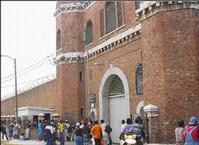
Norman Grindley, Staff Photographer
The Tower Street Adult Correctional Centre.Erica Virtue and Glenda Anderson, Staff Reporters
Jamaica has provided fertile ground for gangs over the years and some police officials believe that the history of criminal gangs go back to pirate Henry Morgan and his Buccaneers.
Sociologists, political scientists, political activists and the police all agree that the inner city areas of Kingston and St. Andrew have given birth to a number of these gangs since Independence.
Most experts say the era of the 1980s gave gangs prominence and character, which blossomed into brutality in the 1990s. Their brutality has been felt both locally and abroad. The experts say during this period, the rise of many gangs coincided with their links to politics and heavy trading in cocaine. The latter provided cash and high-powered weapons. Their cash and cache provide the leeway to bribery and corruption which has affected all sectors of the society.
Many of the gangs are noted mostly for of their viciousness, especially towards members of the security forces. They have also been celebrated for their supposed generosity towards communities, which benefit from their criminal acts.
Providing for communities is often nothing more than a perversion of the Robin Hood philosophy, and the objective is to get cover from the law. But communities often become victims of the very criminals they protect. When they begin to terrorise these communities, it is the police, from whom they are shielded, who are called to protect the communities.
Senior investigating officer at the Organised Crime Investigative Unit, Superinten-dent Devon Watkiss, describes the complex nature of criminal gangs. He said they are formed for different reasons and Jamaica has been a fertile breeding ground.
"In Jamaica we have persons coming together for different reasons. Some come together with a particular objective in mind, and they find it necessary to maintain their existence by doing different things," he said last week.
He said most gangs were forced to be amoebic, in order to maintain their existence.
"You have persons who are primarily political goons, the area for which they normally give support is no longer one that is viable. So, in a bid to support themselves, they become involved in the drug trade, car racketeering, robberies, extortions, anything to maintain themselves," he explained.
According to him, "...But, when the time comes, once it comes back to the political climate, they will revert to their original role, which is to intimidate, terrorise and play their role in facilitating either re-election or election."
In 1999, research done by Donna Moncriffe at the Ministry of National Security and Justice concluded that there were about 49 active gangs in Jamaica, but said, only about 14 per cent of them were highly organised.
However, the police said that by 2001 their figure had risen to about 110, not all of which were active. The OCIU said many are remnants of parent gangs, which are referred to as "splinters" or "spin-offs" of the mother gangs. And these are said to be responsible for most of the violent crimes being committed on the island.
Police Statistics Division has linked gangs and drugs to 196 of the 849 persons murdered in 1999. That figure fell to 126 in the year 2000, largely because of a number of peace initiatives that were in operation in several communities especially in the Corporate Area during that period. By 2001 the figure had climbed to 213 of the 1,139 murders. So far this year, the police say 33 of the 206 murders up to Thursday, March 21, were linked to drugs and gangs.
Sociologist Horace Levy, who has done extensive work in the August Town area of St. Andrew said it was important to distinguish between criminal gangs and community gangs and understand the function of both.
"There is a big difference between criminal gangs and community gangs. Community gangs are formed primarily for defence, to defend their communities from criminality from inside and also outside," he said. According to him, "The experience I have especially in August Town, is that the community gang members are broke. They often commit petty robberies to get some cash, but they are engaged in defending their communities out of a consciousness to safeguard themselves and community members."
Mr. Levy believes that a significant number of those gangs operating over the island were community gangs. Case in point is "Jungle 12" which operates out of August Town. Mr. Levy said it was a community gang, and not a criminal gang.
"The police believe that the gang is aligned to Joel Andem and so has been harassing them. In fact Jungle 12 is at daggers drawn with Joel Andem's gang, and has kicked them out because they do not want any criminals there," he said.
Mr. Levy said there have been murders in the community, but none because of reprisals between community gangs. According to him, up to 1998 there were many murders, but a peace initiative that year saw a decline in those figures.
The Government has been grappling with crime and violence for years and has set up several police units to deal with this. The Reneto Adams-led Crime Management Unit was a special squad formed to tackle gang activities. Despite the measures, homicide figures continue to rise.
Experts all agree, however, that community policing must form an integral part of crime- fighting technique. There is agreement in the Police Force that community policing is an integral of crime fighting mechanisms.
National Security Minister Dr. Peter Phillips said his Ministry is targeting gangs in its drive to fight crime.
On Friday his office said he was off the island.





























